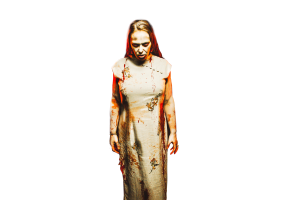Line Up for a Vision Test!
Line Up for a Vision Test!
by R.C. Murphy
There’s reports flooding our servers detailing instances where folks mistake actors for fictional people who live in a plastic box. I’m not talking one report. There’s many. It’s overwhelming. And if I’m honest, it breaks my heart a little to have so many confused people out there in the world.
Surely you jest, R.C.. There’s no way someone’s eyesight is that bad.
No, voice inside my head, this is not a joke. This is merely a response to yet another string of fandom-based attacks on actors who they worship . . . until the writers take the actor’s character on a darker path.
Where does this turn against the talent begin?
I’ve personally witnessed exchanges where fans downright refuse to call an actor by name, insisting, “They’ll always be [character name] to me,” with a laugh like that forgives the rudeness. No, my dude. By transferring the character’s name to the actor, you’ve dehumanized them. It then gives your conscious leeway to continue with a conversation which often accuses the actor, not character, of vile things, like racism, bigotry, rape, and murder. Sometimes the name confusion thing is an honest mistake; though given the age of the internet, that excuse is thinner and thinner by the minute.
The real problem comes when fans continue to dehumanize actors, stripping them of autonomy and presuming they’re directly responsible for their actions on screen. Worse is when fans demand reasoning from the actor. News flash: Actors work from a script written by a team of other people, they’re given direction from yet more people during the filming process, and even then the action on-screen is further changed in the editing room to adjust the scene’s tone or cut in new dialog because something changed last minute. That character worshipped or hated by millions is actually fifteen badgers in a bag pretending to people. One lucky badger gets to be the face, but there’s so much more under the surface. It isn’t fair to actors when fans refuse to differentiate between who they watch on-screen and the person they meet at a comic-con or happen to pass on the street.
How does confusing a name turn into death threats? I’ve honestly got no answer for you. My brain isn’t wired in a way which allows me to even consider the violent actions some so-called fans have taken. Floods of threats happened several times in the seven years TWD has aired. Lori Holden and Sarah Wayne Callies were constantly under fire during their tenure, blamed for every instance their characters made an ill-advised decision and threatened with sexual violence or death if the character didn’t shape up or get killed off of the show. Children on the show aren’t immune to this bile. When Sam panicked during their escape from walker-ridden Alexandria, fans took to social media to call the young man playing Sam degrading names, accusing him of being mentally handicapped, and even going so far as to write fetish-like theories where a child is mutilated by walkers. Even Yahoo’s TV reviewer chimed in, their article vibrating with indignation that a traumatized child dare act traumatized—uh, what? Brighton Sharbino was the subject of a terrifying online campaign, besieged with death threats after her character Lizzie demonstrated sociopathic tendencies and became a threat to her traveling companions, including an infant.
At comic-cons, actors are often followed on the way to the bathroom, into an elevator up to their to their hotel room, and at one event where the greenroom was on an elevated platform some fans camped out and zoomed in with cameras to watch the actors eat. Norman Reedus was bitten, and while the incident was blown out of proportion, it should have never happened in the first place. Keep your mouths to yourself!
In recent weeks, two TWD actors pulled some or all of their social media accounts. Alanna Masterson took to Instagram a while back to firmly reprimand fandom parasites who felt it their duty to police her postpartum weight. While she did deactivate her account for a bit, it appears she’s active again on the site as of the end of May. I doubt the same will be said about Josh McDermitt. We left McDermitt’s character in a really crappy situation—die like Abraham or work for Negan—and every Eugene fan knew what the choice would be; he’d chose life. But there’s still that unhinged group who launched irate messages at McDermitt, putting Eugene’s betrayal on his head and threatening his life so often, he’s reached a breaking point and will not subject himself to the hate any longer. We honestly don’t deserve McDermitt, guys. In the FB Live video recorded before he closed up social media shop, he ended it by stating he loves his fans. There’s people threatening him daily, but he still acknowledges those who genuinely care about him, the actor.
How can we prevent incidents like this in the future? Well, let’s start by assuring everyone can see the differences between an actor and the character they portray on the big screen, TV screen, or stage.
|
Exhibit A: This is an unnamed zombie. Their clothing is torn, dirty, bloody, and doesn’t fit properly. What about makeup? Does it suggest they’re going out to coffee with friends? Nope. It screams, “I’m a god damn zombie, bro! Let’s eat some people.” The zombie’s face/arms/etc. are covered in blood/slime/dirt. |
| Exhibit B:
This is an actor. Who just so happens to be me, and the same person portraying the zombie above. Note that the clothing is neat-ish. Hair is neatly styled. The actor sits in a natural, friendly position for this headshot. There’s no blood or dirt. There’s no underlying need to devour human flesh. There’s little similarity between the figures in the images other than the eyes. |
Given some fan’s theories on how reality works, the fact that I often portray the undead means I should totally be a cannibal, correct? Truth is, I hardly eat meat, let alone desire to take the time to kill a human and process that much flesh for consumption. My hobbies include . . . wait for it . . . using my acting skills to raise money for charity. So tell me again, why would anyone assume an actor in a violent or morally ambiguous role would want to perpetuate the same during their off-time? Acting is emotionally and physically exhausting work. The minute they can drop it and relax, they will. Keep in mind, fake blood is unpleasant at best and a stain-filled, hair-pulling nightmare at worst, and we won’t get into more complicated SFX makeup with its aerospace-quality adhesives and suffocating prosthetic pieces—few actors enjoy the process and certainly wouldn’t endure the extreme discomfort outside of paid gigs. The same can be said for the wardrobe, which is often the same outfit in different stages of disgusting on shows like TWD. Once actors scrape off the makeup and put on their own clothes, that’s it. They’re free elves, no longer controlled by the chaotic chorus—the creative team building their character.
Do yourselves a favor. Make sure you understand the difference between an actor, their character, and the situations in which said actor fully controls the character’s actions—which is rare, despite how many times one hears, “Yeah, he just made that up on set that day.” At the end of the day, the performance the actor delivers isn’t just theirs, but has been manipulated by writers, directors, producers, digital artists, and the editor. Instead of attacking one person over the decisions of many, why don’t you focus your energy on supporting the amazing work they’ve produced? No one, literally no one alive right now needs to endure yet another human being attacking them for situations completely out of their control.


